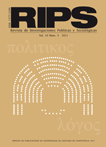Les politiques éducatives à dimension variable: Roumanie, UE et Organisations Internationales. Quellos sont les perspectives pour la société de demain?
Contido principal do artigo
Resumo
Notre société est caractérisée par des changements rapides et importants qui impactent fortement l’éducation. Dans un tel contexte historique, prévoir l’avenir des politiques éducatives devient une mission extrêmement délicate pas seulement pour les décideurs politiques mais aussi pour d’autres figures comme c’est le cas des chercheurs, les parents, les apprenants. Pour cet article, nous avons formulé l’hypothèse que les perspectives éducatives sont fondamentalement assujetties à des facteurs économiques, pédagogiques, géopolitiques et sociaux, à travers une démarche interdisciplinaire mobilisant tant la méthodologie des Sciences de l’Éducation que celle de la Science Politique et du Droit. Dans le but de vérifier cette hypothèse de travail, nous avons mené soixante entretiens semi-directifs auprès des fonctionnaires nationaux, européens et internationaux des organismes d’éducatifs de la Roumanie, des institutions de l’Union européenne et des organisations internationales. L’analyse du discours politique révèle que l’avenir des politiques éducatives est principalement interdépendant des investissements budgétaires dans l’éducation, des défis de vieillissement, des résultats obtenus après un parcours éducatif et de la prise en considération de l’approche « tout au long de la vie ».






